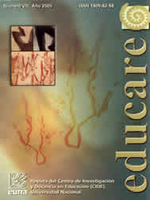Sexismo en Educación Preescolar: la perspectiva docente
DOI:
https://doi.org/10.15359/ree.2005-8.7Abstract
In current society it is impossible not to find sexist elements that discriminate especially women. Stereotypes and beliefs influence this phenomenon. This article studies the opinions held by preschool teachers on this matter. The conclusion is that these teachers have observed differences in the activities boys and girls do, and that these behaviors are learned in their homes.
References
Aguilar, L.; Barley, M.; Bertozzi,Y.; Calvo, Y.; Camac, E.; Camacho, L.; Escalante,A.; Facio, A.; González, M.; Gutiérrez, E.; Quirós, E.; y Trejos, M. ( 1995). ¿Feminismo en Costa Rica?. Testimonios, Reflexiones; Ensayos. San José, Costa Rica: Mujeres.
Ayales, I.; Benítez, M.; Fevrier, S. y Ramírez, I. (s.f.). Género, comunicación y desarrollo sostenible: Aportes conceptuales y metodológicos. San José, Costa Rica: IICA.
Barrantes, R. (2000). Investigación: un camino al conocimiento, un enfoque cuantitativo y cualitativo. San Jose: Editorial de la Universidad Estatal a Distancia.
Castro, S. (1999). Socialización diferenciada por género. San José, Costa Rica: EDILOY.
González, M. (1990). El sexismo en la educación: la discriminación cotidiana. San José, Costa Rica: Editorial Universidad de Costa Rica.
Lagarde, M. (1999). Una mirada feminista en el umbral del milenio. Heredia. Costa
Rica: Instituto de Estudios de la Mujer.
Luna, I. (2003). Andrógina y Postmodernismo: Una aproximación desde la Psiquiatría. En línea.Disponible: http://www.psiquiatria.com/interpsiquis2003/9996
Quirós, Y. (1989). Sistemas de valores y percepción de los roles sexuales en dos sectores de mujeres profesionales costarricenses. Tesis no publicada. Universidad de Costa Rica.
Scala, J. (2001). Género y Derechos humanos. l ª ed. San José, Costa Rica. Ediciones PROMESA.
Published
How to Cite
Issue
Section
License
1. In case the submitted paper is accepted for publication, the author(s) FREELY, COSTLESS, EXCLUSIVELY AND FOR AN INDEFINITE TERM transfer copyrights and patrimonial rights to Universidad Nacional (UNA, Costa Rica). For more details check the Originality Statement and Copyright Transfer Agreement
2. REUTILIZATION RIGHTS: UNA authorizes authors to use, for any purpose (among them selfarchiving or autoarchiving) and to publish in the Internet in any electronic site, the paper´'s final version, both approved and published (post print), as long as it is done with a non commercial purpose, does not generate derivates without previous consentment and recognizes both publisher's name and authorship.
3. The submission and possible publication of the paper in the Educare Electronic Journal is ruled by the Journal’s editorial policies, the institutional rules of Universidad Nacional and the laws of the Republic of Costa Rica. Additionally, any possible difference of opinion or future dispute shall be settled in accordance with the mechanisms of Alternative Dispute Resolution and the Costa Rican Jurisdiction.
4. In all cases, it is understood that the opinions issued are those of the authors and do not necessarily reflect the position and opinion of Educare, CIDE or Universidad Nacional, Costa Rica. It is also understood that, in the exercise of academic freedom, the authors have carried out a rogorous scientific-academic process of research, reflection and argumentation thar lays within the thematic scope of interest of the Journal.
5. The papers published by Educare Electronic Journal use a Creative Commons License:














 The articles published by Educare Electronic Journal can be shared with a Creative Commons License:
The articles published by Educare Electronic Journal can be shared with a Creative Commons License: 



